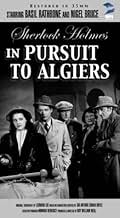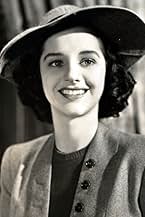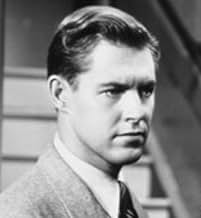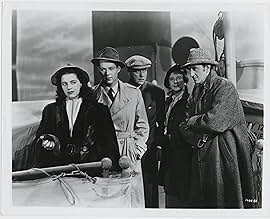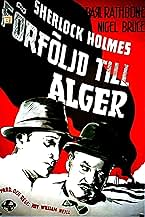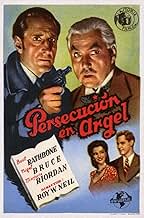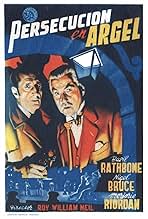IMDb-BEWERTUNG
6,7/10
4372
IHRE BEWERTUNG
Füge eine Handlung in deiner Sprache hinzuHolmes is recruited to escort the heir to a European throne safely back to his homeland after his father's assassination.Holmes is recruited to escort the heir to a European throne safely back to his homeland after his father's assassination.Holmes is recruited to escort the heir to a European throne safely back to his homeland after his father's assassination.
- Regie
- Drehbuch
- Hauptbesetzung
William 'Wee Willie' Davis
- Gubec
- (as Wee Willie Davis)
Frederick Worlock
- Prime Minister
- (as Frederic Worlock)
Wilson Benge
- Clergyman
- (Nicht genannt)
Sven Hugo Borg
- Johansson
- (Nicht genannt)
Ernst Brengt
- Ship Passenger
- (Nicht genannt)
James Carlisle
- Aide
- (Nicht genannt)
Ashley Cowan
- Steward
- (Nicht genannt)
James Craven
- Anton Petzval
- (Nicht genannt)
Empfohlene Bewertungen
Stolen emeralds, an endangered prince, a fog-bound steamship, a plane crash, a revolver hidden in a purse. Through a clever series of encounters, which Sherlock Holmes deciphers with his usual sharp intellect, Holmes and his dear friend, Doctor Watson, are directed to a specific address at a specific time in a foggy London back alley; there, Holmes is engaged by a group of foreign gentlemen to escort an important personage from England back to his home country. While Holmes and Watson do not battle spies in "Pursuit to Algiers," the sleuths do return to matters of foreign intrigue. Leonard Lee wrote the first of two Holmes screenplays for this, the tenth in Universal's Sherlock Holmes series. Lee's screenplay is light on suspense, and, despite the assured direction of veteran Holmes' director Roy William Neill, the film can only be rated better than average among the Rathbone-Bruce movies.
Despite some sinister fog-shrouded scenes in London's back streets, cinematographer Paul Ivano shoots most of the film aboard the S.S. Friesland, a steamer bound for Algiers. While interior shots are crisp black-and-white images, the deck scenes are murky and layered with obviously fake fog. Although the producer-director and the two above-the-title stars are back, not only the writer and cinematographer, but most of the supporting cast are fresh faces in the series. Basil Rathbone and Nigel Bruce are in good form, and Watson is given a bit more to do than usual, including a song entitled "The Bonnie Banks o'Loch Lomond" that spotlights Nigel Bruce's own fine voice; the retelling over dinner of a Holmes adventure, "The Giant Rat of Sumatra;" and a few solo errands of responsibility at Holmes's direction. None of the supporting players stand out, although lovely Marjorie Riordon as a young singer from Brooklyn has a nice voice, and the cold sexually ambiguous Martin Kosleck is appropriately sinister as the knife thrower.
Perhaps after ten episodes the Universal Holmes series had become routine and perfunctory to the participants. The proceedings play out almost entirely aboard a ship, and the plot lacks a single diabolical villain of the caliber of Professor Moriarty or Adrea Spedding, the Spider Woman. However, most Holmes fans should be pleased, and even the sharpest viewers may not guess Holmes's final revelation. While not the best of the series, "Pursuit to Algiers" is good fun and definitely entertaining.
Despite some sinister fog-shrouded scenes in London's back streets, cinematographer Paul Ivano shoots most of the film aboard the S.S. Friesland, a steamer bound for Algiers. While interior shots are crisp black-and-white images, the deck scenes are murky and layered with obviously fake fog. Although the producer-director and the two above-the-title stars are back, not only the writer and cinematographer, but most of the supporting cast are fresh faces in the series. Basil Rathbone and Nigel Bruce are in good form, and Watson is given a bit more to do than usual, including a song entitled "The Bonnie Banks o'Loch Lomond" that spotlights Nigel Bruce's own fine voice; the retelling over dinner of a Holmes adventure, "The Giant Rat of Sumatra;" and a few solo errands of responsibility at Holmes's direction. None of the supporting players stand out, although lovely Marjorie Riordon as a young singer from Brooklyn has a nice voice, and the cold sexually ambiguous Martin Kosleck is appropriately sinister as the knife thrower.
Perhaps after ten episodes the Universal Holmes series had become routine and perfunctory to the participants. The proceedings play out almost entirely aboard a ship, and the plot lacks a single diabolical villain of the caliber of Professor Moriarty or Adrea Spedding, the Spider Woman. However, most Holmes fans should be pleased, and even the sharpest viewers may not guess Holmes's final revelation. While not the best of the series, "Pursuit to Algiers" is good fun and definitely entertaining.
While this is contrived and silly at times, the best part of it, for me, was the fact that everyone knows what Holmes is up to and he still manages to come out on top. There are two plots at work here. One has to do with the transporting of stolen emeralds and the other the transporting of royalty. On numerous occasions, Holmes turns the tables on his adversaries. The dangers are everywhere and his head spins like an owls as he peers over his shoulder, through the fog, and through portholes. He sets up a wonderful ruse. The men who are out to squelch his efforts are really interesting: a mute thug who uses sign language, a wiry Peter Lorre type with a foreign accent, and a sort of Sydney Greenstreet wannabe. Watson becomes enamored with a pretty young singer who is carrying around secrets. He even belts out his own version of "Loch Lomond" and he proves to have quite a beautiful voice. Without giving anything away, Holmes keeps his cards close to his vest until the denouement. He suspects no one; he suspects everyone. I think this is a lesser effort, but still a lot of fun.
The Sherlock Holmes Series is actually fun for the fans of Basil Rathbone and Nigel Bruce, but the individual films are a mixed bag as mysteries themselves. The best mysteries are THE SCARLET CLAW, THE HOUSE OF FEAR, THE ADVENTURES OF SHERLOCK HOLMES, THE HOUND OF THE BASKERVILLES, SHERLOCK HOLMES FACES DEATH. The ones about the war are mediocre - more like curiosities dealing with patriotism and the war effort. After the war the series resumed plots dealing with regular crime. The best of these was THE PEARL OF DEATH, but it was not up to the top five films. One of the final films was this one, PURSUIT TO ALGIERS.
Although all the other films were rewritten from the original Conan Doyle stories, PURSUIT TO ALGIERS was totally made up from a comment dropped in the original "Canon". Doyle wrote four novels and fifty six short stories about Holmes. But in this material (equal in size to say LES MISERABLES or DON QUIXOTE) were many little comments and statements that actually have helped lead to the myriad of essays and books by Holmes' fans. Among other things are the large number of cases of Holmes that he or Watson mention casually, but never write of. In this film, the untold story is "the affair of the steamship "Friesland" that so nearly cost us both our lives". It is mentioned in one of the stories of the series called THE RETURN OF SHERLOCK HOLMES, and is usually said to be set in 1895. The actions of PURSUIT TO ALGIERS take place on the steamship "Friesland", and do almost cost Holmes and Watson their lives, but this film is set after the end of World War II. Since there was no real short story that is nothing to be critical about.
Holmes is not in part of the film (and at one point it seems he has been killed), but he does appear about the middle, and he is in good form when he is. Witness the way he takes care of Martin Kosleck, and the way he makes a typically ironic comment to Kosleck as to why he was able to be prepared. Also the business about party favors is quite nicely done. So are the supporting parts - especially Bruce's comments regarding Rosalind Ivan and John Abbott and his partner. As an entertainment it is a fine film. As a mystery it really never gets very involving. We never understand who is in the background backing the anti-royal assassins. Presumably the Communists (this is 1945), but such a guess is based on the number of Eastern European monarchies that fell following the end of World War II. Still it would help to know who the super-villain is. But then Hitchcock always ignored the central rationales of his "MacGuffins". Why not on this lesser level then? So forget the pleasure of realism, sit back, and just enjoy the antics of the characters. And keep in mind, Basil and Nigel made only two other of these films afterward. It was nearly the end of the series for them and their fans.
Although all the other films were rewritten from the original Conan Doyle stories, PURSUIT TO ALGIERS was totally made up from a comment dropped in the original "Canon". Doyle wrote four novels and fifty six short stories about Holmes. But in this material (equal in size to say LES MISERABLES or DON QUIXOTE) were many little comments and statements that actually have helped lead to the myriad of essays and books by Holmes' fans. Among other things are the large number of cases of Holmes that he or Watson mention casually, but never write of. In this film, the untold story is "the affair of the steamship "Friesland" that so nearly cost us both our lives". It is mentioned in one of the stories of the series called THE RETURN OF SHERLOCK HOLMES, and is usually said to be set in 1895. The actions of PURSUIT TO ALGIERS take place on the steamship "Friesland", and do almost cost Holmes and Watson their lives, but this film is set after the end of World War II. Since there was no real short story that is nothing to be critical about.
Holmes is not in part of the film (and at one point it seems he has been killed), but he does appear about the middle, and he is in good form when he is. Witness the way he takes care of Martin Kosleck, and the way he makes a typically ironic comment to Kosleck as to why he was able to be prepared. Also the business about party favors is quite nicely done. So are the supporting parts - especially Bruce's comments regarding Rosalind Ivan and John Abbott and his partner. As an entertainment it is a fine film. As a mystery it really never gets very involving. We never understand who is in the background backing the anti-royal assassins. Presumably the Communists (this is 1945), but such a guess is based on the number of Eastern European monarchies that fell following the end of World War II. Still it would help to know who the super-villain is. But then Hitchcock always ignored the central rationales of his "MacGuffins". Why not on this lesser level then? So forget the pleasure of realism, sit back, and just enjoy the antics of the characters. And keep in mind, Basil and Nigel made only two other of these films afterward. It was nearly the end of the series for them and their fans.
Most Consider this the Weakest in the Basil Rathbone-Nigel Bruce Series and it Probably is, but that Does Not Mean it is Unwatchable or Worthless. By this, the 12th of the Teams Pairing, the Charm for Fans has Made Itself Undeniable and Unobtrusive Despite Some Silliness and Liberties that the Movies So Often Exhibited.
Mostly Taking Place on an Ocean Liner it is Claustrophobic and Confined and the Supporting Cast is Less than Memorable Playing Weak and Ill Defined Villains. The Film does have a Nice Twist at the End and there is Enough Going On that it just Keeps from Getting Tedious.
Sherlock Keeps Most of His Personal Stingers Directed to Watson at Bay. The Final Line of the Movie is a Tongue in Cheek, In-Joke that is Charming and in Good Spirits.
Mostly Taking Place on an Ocean Liner it is Claustrophobic and Confined and the Supporting Cast is Less than Memorable Playing Weak and Ill Defined Villains. The Film does have a Nice Twist at the End and there is Enough Going On that it just Keeps from Getting Tedious.
Sherlock Keeps Most of His Personal Stingers Directed to Watson at Bay. The Final Line of the Movie is a Tongue in Cheek, In-Joke that is Charming and in Good Spirits.
Despite planning a fishing and shooting holiday in Scotland, Holmes and Dr Watson are approached to help smuggle the Prince Royal of another country back into his homeland. The King has been assassinated already and the Prince is feared to be next. Holmes and the Prince go by plane while Watson travels by boat as a decoy. When Holmes' plane is shot down Watson fears the worst until he finds that Holmes et al are already on the boat. With many days left before Algiers, Holmes must outwit the assassins he suspects are onboard.
I've always enjoyed Watson's contribution to these films just as much as I have Holmes, so I was worried when it looked like Watson would be separated from Holmes for the film. So imagine my happiness when the film actually followed Watson rather than Holmes. Although the film brings Holmes back together with Watson quite quickly, it does give Watson a lot more screen time and respect than they usually do - even going as far to have Holmes praise Watson for his observational skills! This makes a refreshing change - of course Holmes is still the star but it is nice to see him on an almost equal platform for once.
The plot itself is a little worrying at the start but settles once Watson gets on the ship. It allows for some gentleman playing between Holmes and his pursuers who are known to him. This is fun and allows for some nice twists toward the end. The whole thing about the stolen jewels was lost on me and just distracted from the main narrative.
Rathbone is as good as ever and is well worth watching but it is Bruce that impresses here. He does his usual stuff but he gets time to do it and it is fun to see him not being put down by Holmes so much. Holmes' pursuers are better than his usual foes - the amount of screen time that they share and the fact that they are known to each other makes it more enjoyable.
This is a great entry in the series. Bruce rises to the occasion and the twisty confrontation on the ship is very enjoyable as Holmes stays one step ahead. And, having seen the last couple of films end on Holmes giving moral speeches here the film ends on a killer line from Holmes where he advises Watson `never become an actor' - hilarious!
I've always enjoyed Watson's contribution to these films just as much as I have Holmes, so I was worried when it looked like Watson would be separated from Holmes for the film. So imagine my happiness when the film actually followed Watson rather than Holmes. Although the film brings Holmes back together with Watson quite quickly, it does give Watson a lot more screen time and respect than they usually do - even going as far to have Holmes praise Watson for his observational skills! This makes a refreshing change - of course Holmes is still the star but it is nice to see him on an almost equal platform for once.
The plot itself is a little worrying at the start but settles once Watson gets on the ship. It allows for some gentleman playing between Holmes and his pursuers who are known to him. This is fun and allows for some nice twists toward the end. The whole thing about the stolen jewels was lost on me and just distracted from the main narrative.
Rathbone is as good as ever and is well worth watching but it is Bruce that impresses here. He does his usual stuff but he gets time to do it and it is fun to see him not being put down by Holmes so much. Holmes' pursuers are better than his usual foes - the amount of screen time that they share and the fact that they are known to each other makes it more enjoyable.
This is a great entry in the series. Bruce rises to the occasion and the twisty confrontation on the ship is very enjoyable as Holmes stays one step ahead. And, having seen the last couple of films end on Holmes giving moral speeches here the film ends on a killer line from Holmes where he advises Watson `never become an actor' - hilarious!
Wusstest du schon
- WissenswertesThe film contains a couple of clever in-jokes for Holmes aficionados in the form of references to famous unrecorded cases for the Great Detective: at one point Watson begins to recite the tale of The Giant Rat of Sumatra (mentioned in Conan Doyle's "The Adventure of the Sussex Vampire"); whilst the action takes place aboard the S.S. Friesland (from Conan Doyle's "The Adventure of the Norwood Builder", and alluded to as "a Dutch-American liner" in his Professor Challenger book "The Lost World", though here it has links to Malmö in Sweden). The film also borrows some characters and events from "The Adventure of the Red Circle."
- PatzerDr Watson discovers an automatic pistol --- i.e., one with a slide-in ammo-clip instead of a rotating cylinder --- in a lady passenger's handbag. He consistently refers to the handgun as a revolver. An ex-Army officer like Watson, no matter how daft, would never make such an "obvious" mistake.
- Zitate
Sherlock Holmes: Possibly, poison is a woman's weapon.
- VerbindungenEdited into Who Dunit Theater: Sherlock Holmes and Pursuit to Algiers (2021)
Top-Auswahl
Melde dich zum Bewerten an und greife auf die Watchlist für personalisierte Empfehlungen zu.
- How long is Pursuit to Algiers?Powered by Alexa
- Chicago Opening Happened When?
Details
- Erscheinungsdatum
- Herkunftsland
- Sprache
- Auch bekannt als
- Pursuit to Algiers
- Drehorte
- Produktionsfirma
- Weitere beteiligte Unternehmen bei IMDbPro anzeigen
- Laufzeit1 Stunde 5 Minuten
- Farbe
- Seitenverhältnis
- 1.37 : 1
Zu dieser Seite beitragen
Bearbeitung vorschlagen oder fehlenden Inhalt hinzufügen

Oberste Lücke
By what name was Gefährliche Mission (1945) officially released in Canada in English?
Antwort
